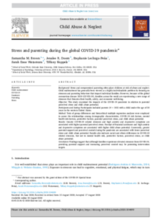Abstract
Background
Stress and compromised parenting often place children at risk of abuse and neglect. Child maltreatment has generally been viewed as a highly individualistic problem by focusing on stressors and parenting behaviors that impact individual families. However, because of the global coronavirus disease 2019 (COVID-19), families across the world are experiencing a new range of stressors that threaten their health, safety, and economic well-being.
Objective
This study examined the impacts of the COVID-19 pandemic in relation to parental perceived stress and child abuse potential.
Participants and Setting
Participants included parents (N = 183) with a child under the age of 18 years in the western United States.
Method
Tests of group differences and hierarchical multiple regression analyses were employed to assess the relationships among demographic characteristics, COVID-19 risk factors, mental health risk factors, protective factors, parental perceived stress, and child abuse potential.
Results
Greater COVID-19 related stressors and high anxiety and depressive symptoms are associated with higher parental perceived stress. Receipt of financial assistance and high anxiety and depressive symptoms are associated with higher child abuse potential. Conversely, greater parental support and perceived control during the pandemic are associated with lower perceived stress and child abuse potential. Results also indicate racial and ethnic differences in COVID-19 related stressors, but not in mental health risk, protective factors, perceived stress, or child abuse potential.
Conclusion
Findings suggest that although families experience elevated stressors from COVID-19, providing parental support and increasing perceived control may be promising intervention targets.

